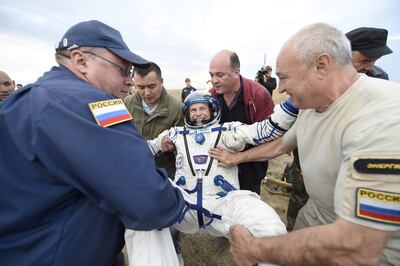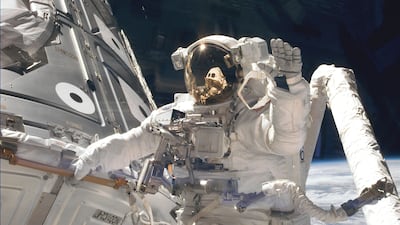Since the earliest space missions, scientists have known that microgravity affects the immune system, putting astronauts at risk of infections and skin conditions.
They even had a theory about why those changes occur, although not how they could reverse them – until now.
The discovery, researchers say, has “huge implications” for our understanding of ageing, because the changes seen to cells in space are also observed as we get older.
“Our work provides a resource to better understand how and why the immune system changes in simulated microgravity and spaceflight,” said Prof Richard Furman, of Weill Cornell Medical College in New York.
“We also provide a way to develop countermeasures to maintain normal immunity under these harsh conditions.”
Researchers led by two scientists from the Buck Institute for Research on Ageing in California wanted to know more about why the changes occur.
They used blood immune cells which had been exposed to a process which simulates the space environment on Earth, combining them with data from space flight from astronauts and mice on the International Space Station.
“We show how simulated microgravity shapes immune cells and how the changes in force alter the cells’ function at the single cell level,” said author Dr Daniel Winer, from the Buck Institute.

“This level of resolution is new and exciting in understanding the effects of microgravity on cells.”
That helped researchers build a picture of how immune system cells like lymphocytes and monocytes are changed by reduced gravity – discovering effects that are also observed during the normal ageing process.
They also wanted to see if they could isolate any drugs or supplements that could protect the cells.
Using artificial intelligence to study more than two million interactions between genes, drugs and foods, the researchers identified dozens of possible compounds, pinpointing one with potential – a plant pigment called quercetin.
The compound, which is found in red onions, grapes, berries, apples and citrus fruits, among other foods, is known to have antioxidant properties.
Researchers tested it on the cells which had been exposed to the space environment, discovering that quercetin reversed approximately 70 per cent of the changes caused by lack of gravity.
“This is the first comprehensive study that provides the scientific community worldwide with an atlas to understand human biology in this extreme condition,” Dr Winer said.
“The implications are huge, beyond humans in space.”

Astronauts’ vulnerability to illness was first noticed in the Apollo missions in the 1960s and 1970s, when just over half of them became sick with colds or other illnesses within a week of their return.
Some of them even experienced the reactivation of dormant viruses, such as chickenpox, prompting researchers to start looking into why that might be.
Space studies
Saudi Arabia's Rayyanah Barnawi, a research scientist, conducted an investigation into human immune cells during a stint onboard the International Space Station last year.
She studied the inflammatory response of the cells in microgravity, including the changes in mRNA decay, a process that regulates gene expression changes in cells and can influence the effects of inflammation.
The ISS tests, which were carried out with the help of Emirati astronaut Sultan Al Neyadi, who is now Minister of State for Youth Affairs, and in parallel with experiments on the ground, to help scientists measure the difference in results.
Researchers hoped the results would better understand the immune system and develop potential therapies for inflammatory diseases in space and on Earth.
Last year, the European Space Agency started an experiment to understand how the body’s immune system was affected by the space environment.
Scientists took samples of astronaut Andreas Mogensen’s blood and saliva before, during and after his mission, which ended on his return to Earth on March 12 after more than 199 days in space.

